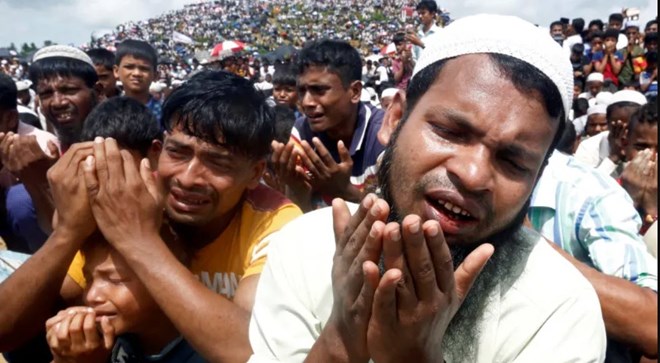
Tuesday December 17, 2019
Lee Yaron

Rohingya refugees pray at a gathering mark the second anniversary of their exodus from Myanmar, at the Kutupalong camp in Cox’s Bazar, Bangladesh, August 25, 2019.Credit Rafiquar Rahman/REUTERS
Global Refugee Forum seeks to support the world's 36 million refugees and asylum seekers, as well as the countries and communities taking them in
GENEVA – More than 70 million people throughout the world have been displaced by wars, violent disputes and persecution, according to data from the UN High Commissioner for Refugees issued in advance of the first Global Refugee Forum, which opens Monday morning in Geneva.
According to the statistics, some 26 million people, half of them younger than 18, have fled their native lands and cannot return, including 5.5 million Palestinians. Of the other refugees, more than two-thirds are from only five countries: Syria (6.7 million); Afghanistan (2.7 million); South Sudan (2.3 million); Myanmar (1.1 million); and Somalia (900,000).
Turkey has taken in the most refugees into its territory, with 3.7 million people, most of them from Syria. Pakistan has taken in 1.4 million people, Uganda 1.2 million and Germany 1.1 million.
The forum is the first being held by the UNHCR, and was organized in cooperation with Switzerland, Costa Rica, Ethiopia, Germany, Pakistan and Turkey. It follows a decade in which the number of refugees and persons without status has reached unprecedented proportions, and it aims to strengthen international support of refugees and facilitate their absorption in various countries until they can return safely to their homelands.
We saw a decade of displacement during which the number of refugees has soared, UN High Commissioner for Refugees Filippo Grandi said ahead of the conference. The conference, he added, must focus on the actions to be taken in the next decade to support the refugees and those countries and communities absorbing them. He called the forum an opportunity to demonstrate the world’s collective commitment to refugees.
More than 2,000 people have been invited to the three-day forum, to be held in the Palais des Nations. They include refugees from various countries, UN Secretary General Antonio Guterres, national leaders, among them German Chancellor Angela Merkel and Turkish President Recep Tayyip Erdogan, civil society organizations and businesspeople. According to Israel’s Foreign Ministry, the Israeli delegation to the UN institutions will be covering the event and a representative from the Population and Immigration Authority will be attending.
The deliberations will focus on six main areas: Arranging and dividing responsibility between countries; education; jobs; energy and infrastructure, solutions and protection. The commission hopes that additional countries and relevant agencies will declare their commitment and pledge assistance for the refugees.
In an official press statement, UNHCR said the conference was meant to pave the way for everyone to take responsibility and fulfill a role, including all levels of government, the private sector, development agencies, financial institutions and faith groups, as well as the refugees themselves. It added that donations pledged at the forum were expected to include financial, technical and material aid, as well as legal and diplomatic adjustments that would allow refugees to better integrate into society.
One country that has already declared its intention to take significant steps is Brazil. Around a week ago Brazil announced it was recognizing 21,000 asylum seekers from Venezuela as refugees, and that their applications for asylum would be expedited, without the need to be interviewed. The Brazilian authorities believe some 224,000 Venezuelan citizens now live in Brazil, and every day some 500 people cross the border between the two countries. To date, more than 750,000 requests for asylum have been filed by Venezuelans all over the world, most in Latin American and Caribbean countries.
According to Israel’s Population Authority, there are 29,000 asylum seekers from Eritrea and Sudan in the country. These people have visas that must be renewed periodically. Some asylum seekers have been in Israel for more than a decade, but their applications for asylum have yet to be examined. As of May, some 15,000 requests for asylum by Eritreans and Sudanese have been awaiting evaluation. Both the state comptroller and the Supreme Court have repeatedly criticized the delay in examining the requests. Only 13 Eritreans and Sudanese have been granted refugee status, less than 0.05 percent. Some 14,000 asylum seekers live in south Tel Aviv; the rest live in Ashdod, Eilat, Bnei Brak, Petah Tikva, Jerusalem, Netanya and Rishon Letzion.
In April of last year the UNHCR and the Israeli government signed an agreement under which some 16,000 asylum seekers would leave Israel and be absorbed in Western countries including Canada, Germany and Italy, while a similar number would become legal residents of Israel. The agreement was deplored by supporters of Prime Minister Benjamin Netanyahu, who canceled the deal a day after it was announced.
Sources involved in the details of the agreement told Haaretz at the time that it was the most generous offer ever suggested to any country by the refugee commission, out of concern for the situation of the asylum seekers in Israel. In an interview published last December, months after the deal was canceled, the UNHCR representative in Israel, Damtew Dessalegne, said that as far as his agency was concerned, the agreement was still relevant.